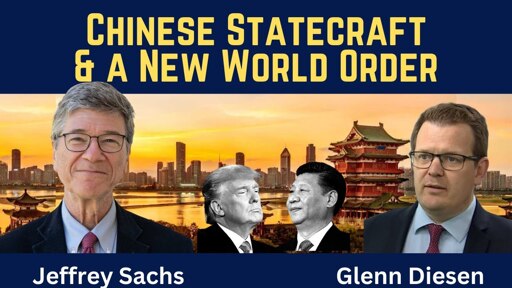You must log in or register to comment.
Cross-post comment:
Generated Summary:
This YouTube video features an interview with Professor Jeffrey Sachs, who discusses the shifting global order, focusing on the rise of China and its implications for the Western-centric world.
Main Topic: The re-emergence of China as a major global power and its challenge to the established Western-dominated world order.
Key Points:
- Historical Context: Sachs emphasizes the long view of history, noting that for most of the last 2000 years, Asia, particularly China, held a dominant position in the world economy. The rise of Europe and the subsequent dominance of the North Atlantic (Europe and the US) in the 19th and 20th centuries was an anomaly.
- China’s “Century of Humiliation”: He highlights China’s decline and subjugation by Western and Japanese powers from the mid-19th century to the mid-20th century, leading to a drastically reduced share of the world economy.
- The Return of China: Sachs argues that China’s current rise is a return to its historical prominence and a rebalancing of a previously unbalanced, Eurocentric world.
- Western Ideologies of Superiority: He points out that the West developed ideologies, including notions of cultural and racial superiority, to justify its dominance, making it difficult for many in the West to accept the shift in global power.
- China’s Distinct Statecraft: Sachs contrasts European statecraft, characterized by fragmentation, constant warfare, and a “realist” view of international relations as inherently anarchic, with China’s history of unification and Confucian emphasis on harmony. He argues that China’s statecraft is different, prioritizing internal order and peaceful relations with neighbors, rather than external imperialism.
- Debate on China’s Future Behavior: Sachs acknowledges the debate on whether China will behave like other great powers, driven by self-interest and competition, or if its unique history and philosophy will lead to a different approach to international relations. He disagrees with the view that China will inevitably follow the same path as previous dominant powers.
Highlights:
- The discussion of the historical context, framing China’s rise as a return to a more normal state of affairs rather than an unprecedented threat.
- Sachs’s critique of Western ideologies of superiority and their influence on perceptions of China.
- The contrasting of European and Chinese statecraft, offering a nuanced perspective on potential future geopolitical dynamics.
- The mention of the debate with John Mearsheimer, a prominent political scientist, who holds a different view on China’s future behavior.



